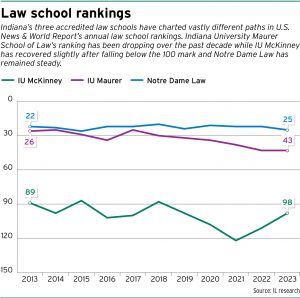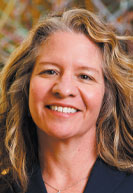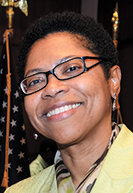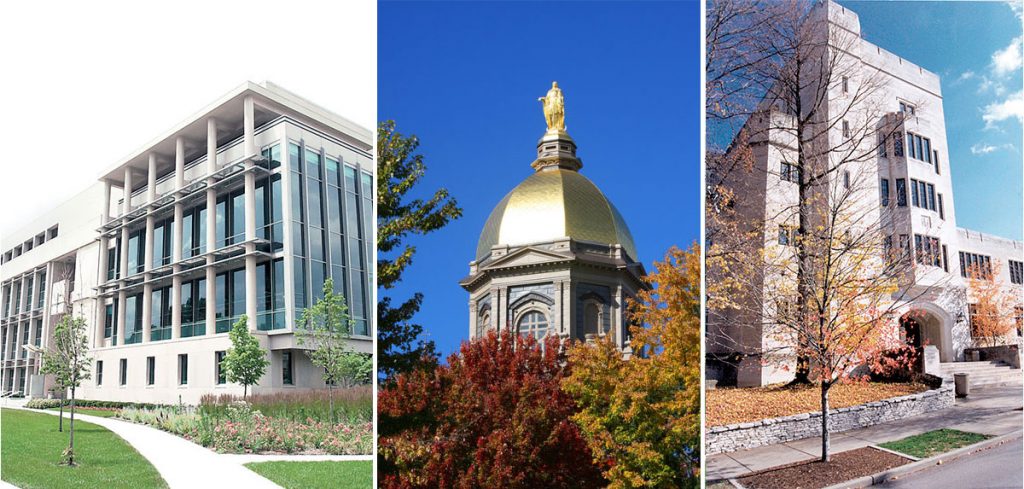[ad_1]
As the previous dean of Indiana College Robert H. McKinney Faculty of Regulation, Gary Roberts remembers effectively what occurred when he give up taking part in U.S. Information & World Report’s annual regulation college rankings: completely nothing.
The Indianapolis regulation college dropped out about 2010 or 2011 however nonetheless appeared within the rankings. Though its standing plunged from 79th within the 2012 rating to 89th then 98th within the 2013 and 2014 rankings, respectively, the establishment subsequently fell beneath 100 after it began submitting its knowledge to the journal once more.

“I simply thought the rankings have been simply perverse in each approach, form and kind,” Roberts mentioned of his choice to give up. “I suppose I used to be simply so offended by them that it simply lastly pushed me over the sting and I mentioned, ‘To hell with these folks.’ I didn’t wish to reward them.”
Maybe essentially the most important result’s that nothing occurred outdoors IU McKinney. U.S. Information didn’t make any modifications to its methodology in response, and the rankings, typically, retained their affect over college students making use of to regulation colleges, professors searching for jobs and regulation companies hiring associates.
Consequently, whether or not the present revolt in opposition to the rankings will trigger some type of response is unknown. Since Yale Regulation Faculty declared on Nov. 16 it could not take part, 11 different regulation colleges have adopted, as of Indiana Lawyer deadline.
IU McKinney, Indiana College Maurer Faculty of Regulation and Notre Dame Regulation Faculty are nonetheless taking part. The 2 IU regulation colleges say they’re monitoring the state of affairs and contemplating their choices whereas Notre Dame declined to share its plans.
Countering the boycott, U.S. Information has asserted it won’t be making modifications and, as an alternative, will proceed to rank all absolutely accredited regulation colleges even when they don’t submit their knowledge.
“The U.S. Information Greatest Regulation Colleges rankings are designed for college students searching for to make the most effective choice for his or her authorized training,” Robert Morse of U.S. Information mentioned in an announcement. “We’ll proceed to pursue our journalistic mission of guaranteeing that college students can depend on the most effective and most correct data, utilizing the rankings as one issue of their regulation college search.”

Ripple impact
Regulation colleges have lengthy complained in regards to the U.S. Information rankings. The considerations are echoed within the statements from the deans who’ve not too long ago joined the boycott.
Specifically, they are saying, the rankings create the mistaken incentives for selecting whom to confess and discourage innovation in curriculum and programming. Additionally, the rankings lead college students and employers to the false concept that higher-ranked colleges are higher than lower-ranked colleges.
“That’s simply absurd,” Daniel Rodriguez, professor and former dean at Northwestern College Pritzker Faculty of Regulation, mentioned. “… The ordinal rating simply makes it sound such as you’re a sucker for those who go to a decrease ranked college though they’re basically the identical.”
In an announcement in regards to the present chilly shoulder being given to the rankings, IU Maurer Dean Christiana Ochoa highlighted the perceived issues with the annual compilation.

“For a few years, our regulation college, along with many others, have implored U.S. Information to be extra attentive to the critiques and recommendations made to the journal by regulation colleges subjected to their rating system,” Ochoa acknowledged. “Our requests have resulted from our observations that the U.S. Information Regulation Faculty Rankings make use of a non-transparent and flawed methodology that ends in extreme and damaging distortions in authorized training that don’t serve college students effectively and are detrimental to society.”
Jeffrey Stake, professor at IU Maurer, mentioned he was intrigued when U.S. Information first revealed its rankings about 35 years in the past and has been learning their impact since.
Candidates, Stake mentioned, are so influenced by the rankings that they are going to flip down scholarships from colleges higher suited to their pursuits to attend a higher-ranked college though they could must pay $50,000 to $100,000 extra. Likewise, regulation companies have a look at the rankings when interviewing candidates for jobs, and alumni turn into agitated when their alma mater falls within the rankings as a result of they consider the worth of their J.D. is decreased.

However at the same time as regulation colleges denounce the rankings, they’ve additionally altered their admissions methods to higher place themselves in U.S. Information.
Stake defined the journal has emphasised LSAT scores and undergraduate grade level averages in its calculations, so regulation colleges are courting and providing scholarships to college students with the very best scores and grades who typically don’t want the monetary help. The candidates who earned a bachelor’s diploma in a extra demanding topic however have a decrease GPA because of this, or who may most profit from a scholarship, are being bypassed.
“It’s actually a travesty,” Stake mentioned. “… You’re turning down college students that appear to be nice candidates for regulation college after which for the authorized occupation and good for the general public as soon as they’re within the authorized occupation and also you’re saying, ‘No, let’s go along with this different person who doesn’t damage us within the U.S. Information.’”
Confluence of occasions

Karen Bravo, dean of IU McKinney, mentioned she is stunned on the revolt however famous many of the establishments becoming a member of are within the prime tier, or what are known as the T-14 regulation colleges. Yale, Harvard, Stanford and the others have the assets and self-perpetuating reputations to resist any repercussion attributable to ignoring U.S. Information.
“It’s a query of energy,” Bravo mentioned. “The faculties which can be within the T-14, they’re in a position to make this transfer and so they’re in a position to say, ‘No,’ to make these factors that I feel many people within the authorized academy make. I have no idea at this level whether or not or not that is going to be a transitional second.”
Regulation colleges are dropping the rankings simply because the U.S. Supreme Courtroom seems poised to search out race-based admissions illegal. The Wall Road Journal editorial board and others have speculated that Yale and Harvard are leaving the rankings to allow them to proceed to enroll extra diversified courses, which could have decrease LSAT and GPA numbers, with out harming their U.S. Information standing.
As well as, the American Bar Affiliation is ending the requirement that regulation colleges use a sound and dependable admissions take a look at just like the LSAT or the Graduate Assessment Examination.
Rodriguez mentioned he sees the exit of the regulation colleges together with the potential for modifications in affirmative motion and entrance exams as presumably diminishing the credibility of the U.S. Information rankings. That, he mentioned, may carry a transitional second, as regulation colleges may then start experimenting with admissions and curriculum.
What is going to most drive regulation colleges to innovate, he mentioned, is strain from public officers in addition to regulation companies and companies that rent the J.D. graduates. When exterior entities insist upon innovation, some colleges will take daring steps.
“If there’s going to be a giant change, it’s going to return from people simply demanding a extremely totally different type of innovation in authorized providers and authorized training,” Rodriguez mentioned. “… I’m reasonably hopeful that’ll occur and that’s why I’m usually supportive of the U.S. Information revolution.
“… I don’t assume it’s a giant, gigantic revolution in authorized training,” he added. “That may require many different steps for that to occur.”•
[ad_2]
Source link


